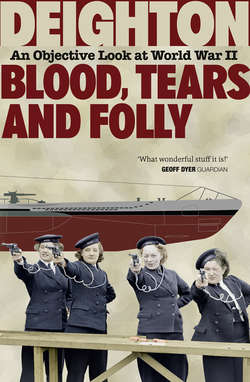Читать книгу Blood, Tears and Folly: An Objective Look at World War II - Len Deighton - Страница 18
3 EXCHANGES OF SECRETS
ОглавлениеWe shall not cease from exploration
And the end of all our exploring
Will be to arrive where we started
And know the place for the first time.
T. S. Eliot, Little Gidding
After the war Churchill admitted that the U-boat successes had been the only thing that frightened him, and it has been widely assumed that Hitler went to war understanding the submarine’s potential value. The truth is that the German navy was completely unprepared for war. At its outbreak, Germany had built 56 U-boats,1 of which some were short-range Type IIs seldom used beyond the North Sea. The building programme was providing two or three submarines a month (in some months only one), and it was taking about a year to build and test each boat. After the war Admiral Dönitz said: ‘A realistic policy would have given Germany a thousand U-boats at the beginning.’ We can but agree and shudder.
One of the war’s most eminent naval historians, S. E. Morison, said Hitler was landsinnig (land-minded) and believed, like Napoleon, that possession of the European ‘heartland’ would bring England to heel. Winston Churchill, like President Roosevelt, knew that Britain’s survival depended upon sea lanes, for without supply by sea there could be no continuation of the war.
